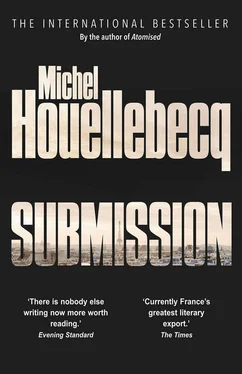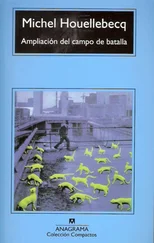Ben Abbes had immediately issued a warm statement hailing the victory of the Muslim Party of Belgium. As it happens, the secretary general, Raymond Stouvenens, had a personal history not unlike Rediger’s: before he converted to Islam, he’d been a high-ranking member of a nativist organisation, though he’d kept his distance from its openly neo-fascist wing.
The buffet car on the Thalys to Brussels had two menus, one traditional and one halal. That was the first transformation I noticed — and the only one. The streets were just as filthy, and the Hotel Métropole, even if its bar was closed, had preserved much of its old splendour. When the train got in, around nine thirty, it was even colder than in Paris. The pavements were covered in blackish snow. I was sitting in a restaurant in the rue de la Montagne-aux-Herbes-Potagères, trying to decide between a chicken waterzooi and an anguille au vert , when all at once I was gripped by the certainty that I understood Huysmans completely, better than he had understood himself, and that I was finally able to write my preface. I had to get back to the hotel and make some notes, and left the restaurant without ordering. (The room-service menu offered chicken waterzooi , which settled that.) It had been a mistake to give too much importance to Huysmans’ glib talk about ‘debauches’ and ‘dissipation’. That was just a Naturalist tic, a contemporary cliché, part of the need to scandalise, to shock the bourgeoisie. In the end, it was a career move; and the opposition he set up between carnal appetite and the rigours of monastic life was equally beside the point. Chastity wasn’t a problem and never had been, not for Huysmans or anyone else. My brief stay at Ligugé had only confirmed this for me. Subject man to erotic stimuli, even in their most standardised form — something as simple as low necklines and short skirts (or in the apt Spanish phrase, tetas y culo ) — and he will feel sexual desire. Remove said stimuli and the desire will go away, and in a matter of months or even weeks he won’t even remember his sexuality. In reality this had never posed the least difficulty for monks, and in my own case, as the new Islamic regime pushed women’s clothing in the direction of decency, I had felt my own sexual impulses gradually diminish. I sometimes went whole days without thinking of sex. With women it might be slightly different, since for women erotic stimuli were more diffuse and thus harder to overcome, but I really didn’t have time to go into that right now, I was taking notes in a frenzy (after I finished my waterzooi I ordered a cheese plate), not only had sex mattered less to Huysmans than he thought, but in the end the same was true of death. Existential anguish simply wasn’t his thing, what had really struck him about Grünewald’s famous Crucifixion wasn’t Christ’s agony but rather his physical suffering, and in this Huysmans was just like everybody else. People don’t really care all that much about their own death. What they really worry about, their one real fixation, is how to avoid physical suffering as much as possible. Even in the realm of art criticism, Huysmans got it all wrong. He had passionately sided with the Impressionists when they ran up against the academic precepts of their time, he had written admiring pages on painters like Gustave Moreau and Odilon Redon; but in his own novels, he identified less with Impressonism or Symbolism than with the much older pictorial tradition of the Dutch masters. In the end, the dream visions of En rade , which actually did recall the strangeness of certain Symbolist paintings, were a failure. At least, they leave a much less vivid impression than his warm, precisely detailed descriptions of meals with the Carhaix in Là-bas . That’s when I realised I’d left my copy of Là-bas in Paris. I had to go back. According to the website, the first Thalys left at five. By 7 a.m. I was home and I looked up the passages where he described the cooking of ‘Maman Carhaix’. Huysmans’ true subject had been bourgeois happiness, a happiness painfully out of reach for a bachelor, and not the happiness of the haute bourgeoisie (the cooking celebrated in Là-bas was instead what you might call good home cooking), much less that of the aristocracy. Huysmans had nothing but contempt for the ‘titled fools’ he ridiculed in L’oblat . His idea of happiness was to have his artist friends over for a pot-au-feu with horseradish sauce, accompanied by an ‘honest’ wine and followed by plum brandy and tobacco, with everyone sitting by the stove while the winter winds battered the towers of Saint-Sulpice. These simple pleasures had been denied him, and only someone as crude and insensitive as Bloy could have been surprised to see him weep over the death, in 1895, of Anna Meunier, his one lasting female acquaintance, the only woman he had ever been able to live with, briefly, until her nervous malady, incurable at the time, sent her into the Saint-Anne asylum.
Later in the day I went out and bought five packs of cigarettes, then I found the menu from that Lebanese caterer, and two weeks later my preface was done. A low-pressure system had entered France from the Azores, there was something balmy and springlike in the air, a kind of suspicious sweetness. Only a year ago, under the same meteorological conditions, you’d have seen the arrival of the first short skirts. I walked down the avenue de Choisy, then the avenue des Gobelins, and turned onto the rue Monge. In a cafe near the Institute of the Arab World, I reread the forty pages I had written. Some of the punctuation needed correcting, a few of the references still had to be filled in, but even so, there was no doubt about it: it was the best thing I’d ever written, the best thing ever written on Huysmans, full stop.
I made my way home slowly on foot, like a little old man, more aware with every step that this time my intellectual life really was over; and that so was my long, very long relationship with Joris-Karl Huysmans.
Naturally, I didn’t say anything to Bastien Lacoue. I knew it would be at least a year, maybe two, before he got worried and gave me a deadline. I had all the time in the world to refine my footnotes. My immediate future promised to be, as they say in English, supercool .
Or maybe just cool, I hedged, as I opened my mailbox for the first time since I’d got back from Brussels; there were still bureaucratic headaches to deal with, and bureaucracy ‘never sleeps’.
I didn’t have the courage to open any of the envelopes just yet. I had spent the past two weeks in what you might call the realms of the ideal . In my own small way, I had created . To go back to my status as an ordinary cog in the bureaucratic machine felt slightly jarring. I did see one not-quite-bureaucratic envelope from the Islamic University of Paris IV-Sorbonne. Aha, I thought to myself.
My ‘aha’ took on a new dimension as I read the contents of the letter: I was invited, the very next day, to the ceremony welcoming Jean-François Loiseleur into his new position of university professor. There would be an official reception in the Richelieu amphitheatre, with a speech, then a cocktail party in an adjacent suite set aside for the purpose.
I remembered Loiseleur very well. He was the one who introduced me to the Journal of Nineteenth-Century Studies , years ago. He had joined the faculty after publishing a groundbreaking dissertation on the poems of Leconte de Lisle. Because he was considered one of the two leaders of the Parnassians, along with Heredia, Leconte de Lisle tended to be dismissed as ‘workmanlike and uninspired’, in the anthologists’ phrase. As an old man, however, in the wake of some kind of mystico-cosmological crisis, Leconte de Lisle had written some strange poems that were unlike anything he or anyone else had ever written. In fact, no one had ever known what to make of them, beyond pointing out that they had all been completely bonkers . Loiseleur could take credit for having unearthed these poems, and for having managed to say something about them, although he wasn’t able to place them in any real literary tradition — according to him, it made more sense to situate them in relation to certain intellectual phenomena known to the ageing Parnassian, such as theosophy or spiritualism. In this way Loiseleur acquired, in a field where he had no rivals, a certain notoriety — not the international status of a Gignac, to be sure, but he was regularly invited to give lectures at Oxford and St Andrews.
Читать дальше







